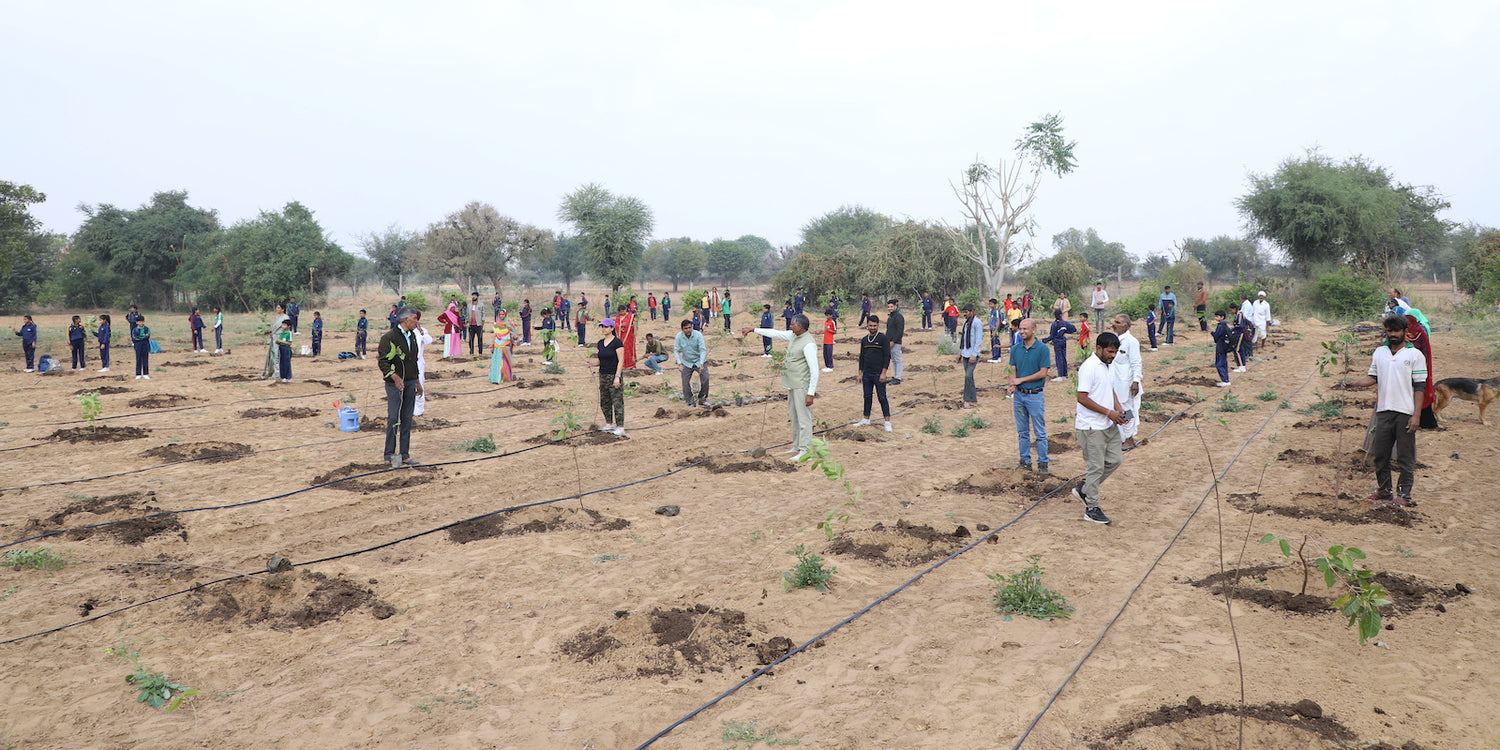Best Native Trees to grow near Mumbai: Urban Greenery
Nestled within the bustling streets and towering buildings of Mumbai lies a hidden treasure - its native trees. These botanical wonders not only enhan Read more
Connect with us
-
👥 Corporates
If you are looking for:
- 🌲 Tree Plantation Events
- 📊 CSR Projects
📧 corporate@growbilliontrees.com
📞 +91 9699723523
💬 +91 9325931304 WhatsApp (Only)
🕒 Mon - Sat | 10am - 7pm IST
-
🧩 Tree Plantation NGOs
If you are looking for:
- 💰 Financial Assistance
- 🤝 Operational Support
📧 support@growbilliontrees.com
📞 +91 9699723523
💬 +91 9325931304 WhatsApp (Only)
🕒 Mon - Sat | 10am - 7pm IST
-
🌼 Individuals
If you are looking for:
- 👥 Group Tree Plantation Drive
- 🌳 Bulk Tree Plantation
📞 +91 9699723523
💬 +91 9325931304 WhatsApp (Only)
🕒 Mon - Sat | 10am - 7pm IST
Plantation Gallery
Trending
Trees for Corporates
Best Native Trees to grow near Mumbai: Urban Greenery
Nestled within the bustling streets and towering buildings of Mumbai lies a hidden treasure - its native trees. These botanical wonders not only enhance the city's aesthetic appeal but also contribute to its ecological balance and resilience. As Mumbai embraces sustainable development, nurturing native trees becomes paramount. Here, we explore a diverse selection of native trees ideal for growing near Mumbai, each offering unique benefits to urban greenery.
Banyan (Ficus benghalensis): With its sprawling canopy and aerial roots, the banyan tree provides shade and shelter, fostering biodiversity in urban landscapes.
Neem (Azadirachta indica): Revered for its medicinal properties, the neem tree's dense foliage offers respite from the sun and helps deter pests.
Peepal (Ficus religiosa): Symbolizing spirituality, the peepal tree's heart-shaped leaves and slender branches create tranquil sanctuaries amid the city's chaos.
Indian Rosewood (Dalbergia sissoo): prized for its sturdy timber and elegant foliage, the Indian rosewood aids in preventing soil erosion near water bodies.
Indian Laburnum (Cassia fistula): Adorned with golden-yellow flowers, the Indian laburnum attracts pollinators and adds vibrancy to urban landscapes.
Jamun (Syzygium cumini): Bearing succulent purple fruits, the jamun tree sustains both humans and wildlife, fostering biodiversity in urban parks.
Mango (Mangifera indica): Beyond its delicious fruit, the mango tree's lush foliage provides shade and contributes to air purification.
Coconut (Cocos nucifera): Known for its versatility, the coconut palm thrives in Mumbai's coastal climate, offering edible fruits and materials for various purposes.
Rain Tree (Samanea saman): With its umbrella-like canopy and nitrogen-fixing properties, the rain tree enriches the soil and provides shelter for urban wildlife.
Indian Almond (Terminalia catappa): With its glossy leaves and decorative fruits, the Indian almond tree enhances the aesthetic appeal of Mumbai's streets and parks.
Indian Cork Tree (Millingtonia hortensis): Celebrated for its fragrant flowers and ornamental value, the Indian cork tree adds beauty to urban landscapes.
Flame-of-the-Forest (Butea monosperma): Drenched in fiery orange blooms during the spring, the flame-of-the-forest tree adds a splash of color to Mumbai's streetscapes.
Indian Coral Tree (Erythrina variegata): With its striking red flowers and robust growth, the Indian coral tree attracts pollinators and dazzles passersby.
Indian Gooseberry (Phyllanthus emblica): Valued for its medicinal and culinary uses, the Indian gooseberry tree thrives in Mumbai's tropical climate, offering both sustenance and shade.
Indian Beech (Pongamia pinnata): Known for its oil-rich seeds and nitrogen-fixing capabilities, the Indian beech tree supports sustainable agriculture and urban greening efforts.
Indian Laurel (Terminalia elliptica): With its dense foliage and tolerance to urban pollution, the Indian laurel tree serves as a resilient green guardian in Mumbai's concrete jungle.
Cluster Fig (Ficus racemosa): Bearing edible figs and providing habitat for birds and small mammals, the cluster fig tree enriches Mumbai's biodiversity.
Indian Mast Tree (Polyalthia longifolia): With its slender profile and evergreen foliage, the Indian mast tree adds vertical interest to Mumbai's skyline while offering shade and shelter.
Indian Cork Fig (Ficus infectoria): Adorned with figs that attract birds and bats, the Indian cork fig tree contributes to Mumbai's urban ecosystem's food web.
Mahua (Madhuca longifolia): Celebrated for its edible flowers and medicinal properties, the mahua tree holds cultural significance while providing sustenance to wildlife.
Indian Sandalwood (Santalum album): Valued for its aromatic wood and essential oil, the Indian sandalwood tree lends its fragrance to Mumbai's green spaces, creating sensory delights for residents and visitors alike.
Cannonball Tree (Couroupita guianensis): With its unique spherical fruits and fragrant flowers, the cannonball tree adds intrigue to Mumbai's botanical gardens and parks.
Wild Almond (Sterculia foetida): With its large leaves and colorful fruits, the wild almond tree attracts birds and small mammals, contributing to Mumbai's urban biodiversity.
Wild Mango (Mangifera sylvatica): Resembling its cultivated counterpart, the wild mango tree offers edible fruits and shade, enriching Mumbai's green cover.
Indian Gooseberry (Emblica ribes): Similar to Phyllanthus emblica, Emblica ribes is prized for its medicinal properties and tolerance to urban conditions, making it a valuable addition to Mumbai's streetscapes.
Indian Beechwood (Pongamia glabra): Another member of the Pongamia genus, Pongamia glabra, known as Indian beechwood, contributes to Mumbai's urban forestry efforts with its fast growth and nitrogen-fixing abilities.
Indian Coral Bean (Erythrina indica): With its vibrant red flowers and drought tolerance, the Indian coral bean tree thrives in Mumbai's challenging urban environment, providing beauty and resilience.
Indian Fir (Abies spectabilis): Though native to the Himalayas, the Indian fir adapts well to Mumbai's climate, offering evergreen foliage and a touch of mountainous charm to the city's parks and gardens.
Indian Cork Oak (Quercus serrata): Resilient and long-lived, the Indian cork oak tree withstands urban pressures while providing habitat for wildlife and enhancing Mumbai's greenery.
Indian Laurel Fig (Ficus microcarpa): With its small, glossy leaves and tolerance to pruning, the Indian laurel fig tree is a versatile addition to Mumbai's urban forests, offering shade and ornamental value.
Growbilliontrees: In the pursuit of greening Mumbai's urban landscape, initiatives like Growbilliontrees play a pivotal role. By collaborating with NGOs, corporates, and other stakeholders, Growbilliontrees provides the necessary technology, knowledge, and tools to optimize, organize, and monitor tree plantation activities. Through their concerted efforts, Mumbai can embark on a transformative journey towards a greener, healthier, and more sustainable future.
As Mumbai continues to evolve, let us not forget the importance of preserving and nurturing its native trees. By embracing these botanical treasures and leveraging the expertise of organizations like Growbilliontrees, we can ensure that Mumbai remains a vibrant, green oasis for generations to come.
Evergreen Trees
Evergreen trees are a perfect choice for urban greenery near Mumbai, as they maintain their lush foliage year-round, adding vibrancy to the landscape regardless of the season. Species like Gulmohar and Rain Tree not only provide shade but also burst into colorful blooms, enhancing the aesthetic appeal of the surroundings.
Fast-Growing Trees
In a bustling city like Mumbai, where space is at a premium, fast-growing trees like Neem and Indian Beech are invaluable. Their rapid growth rate ensures quick establishment, offering shade and improving air quality in a relatively short span of time, making them ideal candidates for urban greening projects.
Drought-Tolerant Trees
Mumbai's erratic rainfall patterns necessitate the inclusion of drought-tolerant trees such as Peepal and Banyan in urban greenery initiatives. These hardy species can withstand prolonged periods of dryness, requiring minimal irrigation once established, thereby conserving water resources and ensuring the sustainability of green spaces.
Fruit-Bearing Trees
Introducing fruit-bearing trees like Mango and Jamun into Mumbai's urban landscape not only enhances its aesthetic appeal but also provides a source of fresh produce for local residents. These trees attract wildlife, promote biodiversity, and offer a tangible connection to nature in the midst of urban development.
Native Flowering Trees
Native flowering trees such as Tabebuia and Cassia bring bursts of color and fragrance to Mumbai's urban greenery, attracting pollinators and delighting passersby with their seasonal blooms. Their presence not only beautifies the cityscape but also contributes to the overall well-being of its inhabitants by fostering a sense of joy and connection to nature.
Shade Trees
Shade trees play a crucial role in mitigating the urban heat island effect in Mumbai, providing relief from the scorching sun and creating comfortable outdoor spaces for recreation and relaxation. Species like Ashoka and Indian Coral Tree are prized for their dense canopies and cooling properties, making them indispensable components of urban greening initiatives aimed at enhancing livability and sustainability.
You may like
Corporate Plantations
FAQ
What are the best native trees to grow in Mumbai for urban greenery?
Mumbai's urban landscape benefits greatly from native trees like Neem (Azadirachta indica), Peepal (Ficus religiosa), Banyan (Ficus benghalensis), and Indian Almond (Terminalia catappa). These species are well-suited to the local climate and soil conditions, offering shade, oxygen, and habitat for wildlife.
How can I ensure the successful growth of native trees in Mumbai's urban environment?
Successful tree growth in Mumbai relies on proper site selection, adequate watering, regular pruning, and protection from pests and diseases. Additionally, choosing the right species for your specific location and considering factors like soil type and sunlight exposure are crucial for optimal growth.
Are there any specific challenges in growing native trees in Mumbai's urban areas?
Mumbai's urban areas pose challenges such as pollution, limited space, and competition from non-native species. However, with proper care and maintenance, native trees can thrive and contribute significantly to urban greenery, enhancing biodiversity and improving air quality.
What are the benefits of planting native trees near Mumbai?
Planting native trees near Mumbai offers numerous benefits, including reducing air pollution, mitigating urban heat island effects, providing habitat for local wildlife, and improving overall aesthetic appeal. Additionally, native trees require less maintenance and are more resilient to local environmental conditions.
How can I get involved in native tree planting initiatives in Mumbai?
You can get involved in native tree planting initiatives in Mumbai by participating in community tree planting events, volunteering with local environmental organizations, or supporting initiatives like ours at GrowBillionTrees.com through donations or sponsorship.
What is the impact of urban greenery on the quality of life in Mumbai?
Urban greenery in Mumbai enhances the quality of life by providing recreational spaces, reducing stress, improving mental well-being, and fostering a sense of connection with nature. Additionally, it helps regulate local climate, conserve biodiversity, and promote sustainable urban development.
Are there any government regulations or guidelines for planting native trees in Mumbai?
Yes, there are government regulations and guidelines for planting native trees in Mumbai, including species selection criteria, planting techniques, and maintenance standards. It's essential to comply with these regulations to ensure the long-term success and sustainability of urban greening efforts.
How does GrowBillionTrees.com contribute to native tree planting efforts in Mumbai?
GrowBillionTrees.com actively contributes to native tree planting efforts in Mumbai by organizing tree planting drives, partnering with local communities and organizations, and raising awareness about the importance of urban greenery. Through our initiatives, we aim to inspire individuals and communities to take action towards a greener, more sustainable future for Mumbai.























